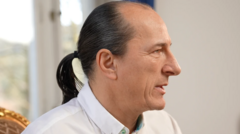In coordinated raids across seven German states, around 800 security personnel apprehended Fitzek, a former chef turned self-styled monarch. Fitzek, who has garnered attention for claiming to lead the "Königreich Deutschland" or "Kingdom of Germany," has been a prominent figure among the Reichsbürger, a movement that rejects the legitimacy of the German government.
The German Interior Minister, Alexander Dobrindt, stated that the group was dismantled for trying to “infect public trust” with antisemitic conspiracy theories and by creating a parallel state structure. The government accused them of financial misconduct, alleging the group funded itself through “economic criminal structures.”
Fitzek, 59, has attracted followers by asserting he has royal authority, even having staged a crowning ceremony in 2012. Over the years, he asserted control over various properties throughout Germany and claimed to have thousands of "subjects" loyal to his cause. In a 2022 interview, he portrayed the federal government as "sick" and expressed disinterest in being part of the modern state, which he deems oppressive.
Germany has seen a rise in the Reichsbürger movement, which now numbers approximately 25,000. Many within this segment are classified as right-wing extremists who disseminate racist and antisemitic ideologies and often confront law enforcement aggressively. The government is particularly concerned about the violent potential of around 2,500 of its members.
Fitzek’s recent arrest follows a series of crackdowns on agents of chaos within the Reichsbürger community, including a 2022 incident where dozens were captured for plotting to orchestrate a violent coup. These extremities are being taken seriously by officials, who have shifted their stance from dismissing these individuals as eccentrics to viewing them as a substantial threat to national stability.
The federal prosecutor's office in Karlsruhe expressed that Fitzek and his associates held significant influence within the group, classifying the "Königreich Deutschland" as a criminal organization. The movement’s claims of sovereignty are now viewed as direct challenges to German democracy, intensifying the scrutiny against both Fitzek and the Reichsbürger at large.



















